Tag: citizenship
Madeleine Kabena – Advocate Profile
Two days after arriving in the US, Madeleine Kabena found herself in an emergency room with her five-year-old daughter, Aline. Despite how it sounds, this was exactly why Madeleine and her family applied for the Diversity Visa lottery that allowed them to immigrate. They came here to find treatment for Aline, who was born with a genetic disorder. Although her health problem doesn’t have a cure, regular treatments can vastly improve both symptoms and outlook. At home in the Congo, treatment was limited and the threat of malaria loomed daily.
[caption id="attachment_1737" align="alignright" width="225"]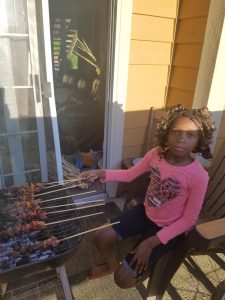 Madeleine's daughter[/caption]
While Madeleine brought her family here so her daughter could have a better life, it hasn’t all been easy. At first, it was a high to be in the United States but then reality began to sink in. There were the usual things, like learning a new language, but also some deeper issues. Food at the hospital was not good and she wasn’t finding traditional foods in her neighborhood. In the Congo, there are more than 200 cultures and what connects them all is the belief in good food. It is even thought that some disease can be healed through a healthy and nourishing diet. In fact, this is what Madeleine believes allowed her daughter to survive so long without regular treatments.
Madeleine's daughter[/caption]
While Madeleine brought her family here so her daughter could have a better life, it hasn’t all been easy. At first, it was a high to be in the United States but then reality began to sink in. There were the usual things, like learning a new language, but also some deeper issues. Food at the hospital was not good and she wasn’t finding traditional foods in her neighborhood. In the Congo, there are more than 200 cultures and what connects them all is the belief in good food. It is even thought that some disease can be healed through a healthy and nourishing diet. In fact, this is what Madeleine believes allowed her daughter to survive so long without regular treatments.
[caption id="attachment_1744" align="alignleft" width="169"]“Luckily I found that Chinese and Hispanic produce is very similar to Congolese. I shop there for vegetables like cassava, okra, and greens.”
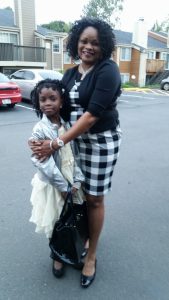 Madeleine with her daughter[/caption]
By searching for culturally appropriate foods, Madeleine discovered a distinct lack of Congolese shops, restaurants, or even organizations in King County. In all her asking around for connections to food, she eventually met a Congolese man who called himself a ‘Community Food Advocate.’ Madeleine was intrigued and hopeful. Over the first few years in the US, she worked as a caregiver at Wesley Homes. Her first profession was as a lawyer but her degree didn’t permit her to practice in the US. Becoming an advocate with FIN allowed her to represent people again while also building food connections for her community.
Madeleine with her daughter[/caption]
By searching for culturally appropriate foods, Madeleine discovered a distinct lack of Congolese shops, restaurants, or even organizations in King County. In all her asking around for connections to food, she eventually met a Congolese man who called himself a ‘Community Food Advocate.’ Madeleine was intrigued and hopeful. Over the first few years in the US, she worked as a caregiver at Wesley Homes. Her first profession was as a lawyer but her degree didn’t permit her to practice in the US. Becoming an advocate with FIN allowed her to represent people again while also building food connections for her community.
Madeleine’s hopes for the Congolese community in King County are the same as her hopes for her own family. In her own words... “I want people to have the best chance at life. And for us, that starts with things like healthcare and jobs but always ends with food and family.”“Unlike what I see in the Latino and Somali communities, the Congolese community here is small and very spread out. We sometimes struggle to connect with each other.”
Zozan Shamdeen – Advocate Profile
One thing Zozan’s family has taught her is not to be afraid. But as a refugee, she hasn’t always been able to freely go after her dreams – even after making it to the US. Her family came this country as refugees from Iraq when Zozan was in middle school. By high school she dreamed about becoming a pediatrician and was on track to receive her green card and enter college.
[caption id="attachment_1430" align="alignright" width="300"]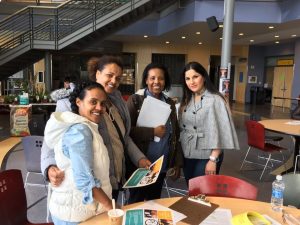 Zozan with fellow advocates.[/caption]
A clerical error over a date in her documentation caused all of that to be put on hold. She spent the next five years in legal limbo – all documentation had been revoked. And while her siblings all received citizenship, she was working with an immigration lawyer. Deportation loomed as an ever-present threat. Immigration officials told her not to worry, that in the event of deportation she would receive $200 and a plane ticket to Baghdad. As if a small amount of cash and a plane ticket to an unfamiliar city felt reassuring.
In the end, she was approved for a green card with the condition that she would never visit the middle east. During this process, Zozan learned the power of helping people gain a voice. Just hearing other people’s stories and volunteering allowed her to forget her own problems for a short time. She found herself providing language support to newcomers and soon after became a medical interpreter.
[caption id="attachment_1441" align="alignleft" width="300"]
Zozan with fellow advocates.[/caption]
A clerical error over a date in her documentation caused all of that to be put on hold. She spent the next five years in legal limbo – all documentation had been revoked. And while her siblings all received citizenship, she was working with an immigration lawyer. Deportation loomed as an ever-present threat. Immigration officials told her not to worry, that in the event of deportation she would receive $200 and a plane ticket to Baghdad. As if a small amount of cash and a plane ticket to an unfamiliar city felt reassuring.
In the end, she was approved for a green card with the condition that she would never visit the middle east. During this process, Zozan learned the power of helping people gain a voice. Just hearing other people’s stories and volunteering allowed her to forget her own problems for a short time. She found herself providing language support to newcomers and soon after became a medical interpreter.
[caption id="attachment_1441" align="alignleft" width="300"]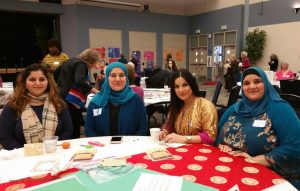 Zozan with her sisters.[/caption]
While she still thinks about going back to school, her dreams now are a little different that they were in high school. Instead of children, she is now more focused on supports for refugee parents. Kids learn faster than their parents and are the focus of a lot of support already. Zozan believes parents need a lot of extra support in cultural and language barriers. For now, she does this through medical interpreting and as an assistant teacher in the ESL department at Highline College. “If someone needs help and I can do it, I will be there. If I can’t do it, I will try.”
In her spare time, Zozan runs a catering company with her sister and advocates for food system change in South King County. Becoming a FIN Food Advocate was a natural fit because she is passionate about helping people see their options and keep moving toward the future. She and her sister have also received training and help in their business through FIN. “You get and you give,” she says, “it’s a circle that way.” She asks us all to be open to possibility, if you don’t try new things and ask for help you will never get what you want.
Zozan with her sisters.[/caption]
While she still thinks about going back to school, her dreams now are a little different that they were in high school. Instead of children, she is now more focused on supports for refugee parents. Kids learn faster than their parents and are the focus of a lot of support already. Zozan believes parents need a lot of extra support in cultural and language barriers. For now, she does this through medical interpreting and as an assistant teacher in the ESL department at Highline College. “If someone needs help and I can do it, I will be there. If I can’t do it, I will try.”
In her spare time, Zozan runs a catering company with her sister and advocates for food system change in South King County. Becoming a FIN Food Advocate was a natural fit because she is passionate about helping people see their options and keep moving toward the future. She and her sister have also received training and help in their business through FIN. “You get and you give,” she says, “it’s a circle that way.” She asks us all to be open to possibility, if you don’t try new things and ask for help you will never get what you want.
FIN’s newest staff member shares views on cultural identity as an Iraqi-American.
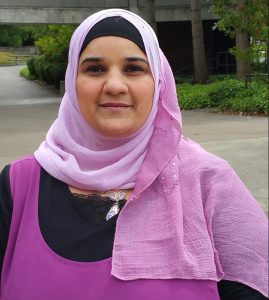
Sheelan Shamdeen, FIN Program Assistant
Sheelan Shamdeen, a Kurdish-Iraqi refugee, began working with FIN as a graduate of Project Feast’s Apprenticeship Program. Also a client of StartZone at Highline College, she and her sister found support in planning their own Iraqi catering company - Soozveen. But catering is only a small part of her story. In fact, Sheelan looks at their catering company as tool to bridge her two identities as a Kursdish-Iraqi refugee and an American citizen – food is a platform for dialogue she says. “We had 24 hours to leave and weren’t sure where we were going.” Sheelan and her family fled Iraq in 1996 when Saddam Hussein announced anyone associated with the UN would be publicly hanged. They, along with countless others, spent 3 nights under a tent with no passports - their only keepsake from home a teddy bear her sister had saved. Although they were safe once they reached Turkey, they had a long unknown journey ahead of them. Arriving in Guam, many families squeezed into tight living quarters for months while official paperwork was filed to enter the US with green cards. Twenty years later Sheelan, her mother, and seven siblings are all US citizens. Many of those years have been spent teaching English to other immigrants and refugees at Highline College. Although she remembers every detail of her life in Iraq, she also embraces American culture and encourages newcomers to do the same. “Many refugees feel this is only temporary – that this is not their home. But this is the place that helped my family survive and I believe I have two homes now.” To her, she is truly accepted in America as a human being - not a Muslim or an Iraqi but as a person. Despite the things sometimes said in media and politics, she feels like she belongs here. Sheelan doesn’t want any immigrant to lose their language or culture but believes it is important to also feel at home here. In America it is possible to celebrate both patriotism and cultural diversity in the same breath. Sharing Iraqi food with people is just one way that she can start conversations about cultural identity.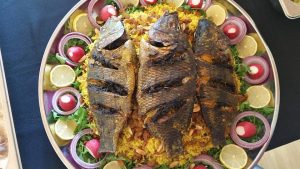 Over two years have passed since Sheelan was first introduced to FIN. She was part of the first group of Community Food Advocates, recently joined the first cohort FIN Entrepreneurs and, in September 2016, took a staff position as FIN’s Program Assistant. Being a refugee means Sheelan knows what it feels like to start something from nothing. She brings compassion into her work and is quick to respond in a moment of need. All she asks of those around her is to be open minded.
Sheelan's advice to all people: “Ask questions before assuming you know someone’s story. Keep learning –there are so many free resources out there. And if you can’t find anything to learn then start a conversation with someone new.”
Over two years have passed since Sheelan was first introduced to FIN. She was part of the first group of Community Food Advocates, recently joined the first cohort FIN Entrepreneurs and, in September 2016, took a staff position as FIN’s Program Assistant. Being a refugee means Sheelan knows what it feels like to start something from nothing. She brings compassion into her work and is quick to respond in a moment of need. All she asks of those around her is to be open minded.
Sheelan's advice to all people: “Ask questions before assuming you know someone’s story. Keep learning –there are so many free resources out there. And if you can’t find anything to learn then start a conversation with someone new.”
by Allison Mountjoy January 9, 2017, 10:30AM PST
Jaqueline Garcia: Community Food Advocate
From Motherhood to Social Justice Activista
At 31, Jaqueline Garcia is a force of nature. From empowering Latina mothers to small business advisor, it is motherhood that really fueled her ambition. Jaqueline left Mexico and a burgeoning dentistry practice when she and her husband moved to San Francisco. Intending to continue dentistry in the States, a different course began to unfold when they moved to Seattle and Jaqueline became pregnant. Although happy, she was very far away from her support system. Jaqueline explains: “this was a moment that I felt very isolated from family and depressed.” That moment was also the catalyst for her to become a community leader. (more…)Floribert Mubalama, Community Food Advocate and Congolese Refugee
One of the highlights of FIN's 2015 Celebration was a presentation on refugee experiences. Floribert walked through the physical, psychological, and emotional impact of the Congo's last 20 years of war and the jarring loss of identity felt in the refugee camps. To him, this is a death and the transition to life in the US is like being reborn. Although transformative, arrival is also met with a loss of culture, lack of familiar foods, and a healthcare and social system that seems impossible to navigate. After spending only 1 year in the United States, Floribert is a leader in his local community. He currently works full time, attends school, participates as a Community Food Advocate, and in 2016 will begin co-chairing a FIN working group. What drives him? Floribert speaks of simple solutions to aid in integration and prioritizing supports for refugees to become successful citizens of the US.
